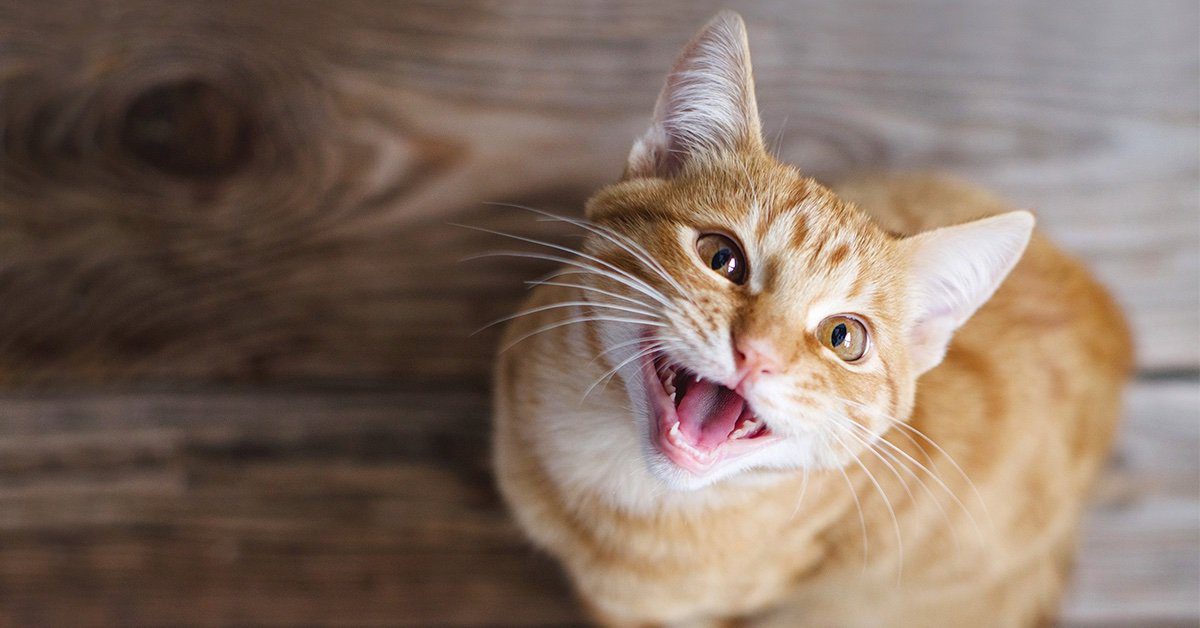A cat’s meow is their way of communicating with people. Whether they’re meowing, howling, or wailing, this is their way of expressing their feelings and needs. While this can sometimes be annoying, our feline friends meow to say hello, ask for delicious cat food, and to tell us that something is wrong.
As a cat owner, you know your feline friend better than anyone. You know when your cat’s angry or upset, and when they’re in the mood to play. A lot of their emotions are differentiated by the different tones and noises a cat makes, and they often change as a kitten gets older and becomes an adult cat. All cats will meow to some extent, but how do you know when a cat’s meowing becomes excessive? Here, we have outlined when cat meowing is normal, and when it may become a cause for concern.
Why do cats meow?
Cats learn to communicate with us just like we learn to communicate with them. Your cat may have learned that if they meow, people will talk back to them, play with them, or feed them. Interestingly enough, when cats grow out of kittenhood, they no longer meow to other cats. Instead, they use other vocalizations – such as yowling, hissing, and growling – to communicate with each other.
The amount of meowing can also vary amongst different cat breeds. For instance, Siamese cats are known to be great talkers, and Sphynx cats are known to be extremely chatty and demanding when they set their minds to it. Some cats simply like to hear their own voice, while others seem to want to carry on a conversation with their owner. The more you enable this type of cat behavior, the more your cat will meow. As you probably know, most cats will outlast you, so you’ll probably give in to their meowing demands.

If your cat is meowing more than you’d like, try to figure out the cause first. Once you know the reasons, you can work on getting them to meow less. These are the most common reasons why cats meow:
- To greet people: Has your cat ever greeted you at the door after a long day? This is your cat’s way of saying hello, and they’ll most likely begin meowing and purring at you.
- To demand attention: Some cats enjoy social interaction just as much as humans do. They’ll often meow to indicate they want to be stroked, played with, or simply talked to. If your cat is left alone for long periods of time, they may even become more likely to meow for attention.
- To ask for food: Cats like to eat, and they can be quite demanding when they know it’s dinner time. Cats are intuitive animals, and may even learn to meow whenever anyone enters the kitchen.
- To ask to be let in/out: If your cat needs to go outside, they’ll likely learn to meow at the door. When they’re ready to come back in, they’ll meow again.
When does cat meowing become excessive?
There’s a difference between a cat meowing loudly for breakfast and a cat meowing loudly in the middle of the night for no apparent reason. It’s important to remember that vocalization is normal since it’s the way cats communicate with each other and with us. What is considered to be excessive vocalization depends on the tolerance level of the pet owner as well as the perceived reason for the vocalization. Increases in vocalization are common when there are changes in the household, such as moving to a new place or a new addition to the family, like introducing a new kitten or baby.
When to take your meowing cat to the veterinarian
If you have a cat who is meowing excessively, take them to a veterinarian so a proper diagnosis can be made. While excessive vocalization can be a ploy for attention, it can also indicate the presence of a medical condition such as a UTI or ear infection or a more serious behavior problem such as aggression. Cats may meow excessively when they’re in pain or have neurological problems or sensory deficits, such as hearing or vision loss. Anxiety, frustration, cognitive dysfunction, or other common cat behavioral problems can also cause excessive vocalization.
Numerous diseases can cause cats to feel unusually hungry, thirsty, restless, or irritable, which will likely prompt excessive meowing. As cats age, they’re prone to developing overactive thyroid and kidney disease, which may result in excessive meowing. Older cats suffering from mental confusion or cognitive dysfunction may meow if they become disoriented, which can sometimes be a manifestation of Alzheimer’s Disease.
Pet Pro Tip: New to feline dental care? Join the Pumpkin Wellness Club, a new program that actually pays you for getting your cat the routine preventive care that they need to stay healthy. Members have the option to get up to $150 in cash for dental cleanings each year, plus even more savings on vaccines and annual health screenings.
How do you treat excessive vocalization?
Even if your cat has a history of meowing excessively to demand their cat food, you should still take them to the veterinarian just to be safe. You want to rule out any illness or underlying medical condition and get recommendations to curb their excessive meowing. If your vet determines the cause of their repeated meowing isn’t medical, they will try to determine why your cat is seeking more attention. They may be bored and require more stimulation and physical activity. In this case, develop a daily routine that provides your cat with a variety of social activities, focusing on when and where your pet is most likely to meow. In general, make sure to schedule playtime or stimulating training activity before the problem arises.
If you’re providing your cat with enough mental and physical stimulation and they’re still meowing excessively, you should never:
- Ignore your cat. Although you don’t want to reward their excessive meowing, they’re most likely meowing for a reason. They may not be able to reach their litter box, their food or water bowl could be empty, or they could be trapped somewhere uncomfortable. Be sure to check on them to determine if their meowing is something you can safely ignore, or if there’s a problem that needs to be solved.
- Punish your cat. Hitting, shouting, or spraying cats with water rarely quiets a meowing cat, and these actions can make your cat distrust you.
- Give in to your cat. If your cat is used to getting whatever they want from meowing, giving in will only cause them to meow louder and more frequently. Continue to reward quiet behavior, and soon enough they will get the idea.
Before attempting to curb your cat’s meowing, be sure to speak to your veterinarian to determine if their meowing is an attention-seeking habit or a bigger problem. As solitary as cats may be, they do like to play and be challenged, so mental and physical enrichment may be a good way to quiet them down. If they’re too tired to meow, they might even let you sleep through the night, too.
If your kitty ever does begin to meow excessively indicating a behavioral issue, talking to your vet can help. See how Pumpkin Cat insurance plans can help you afford the best care for covered behavioral issues.




